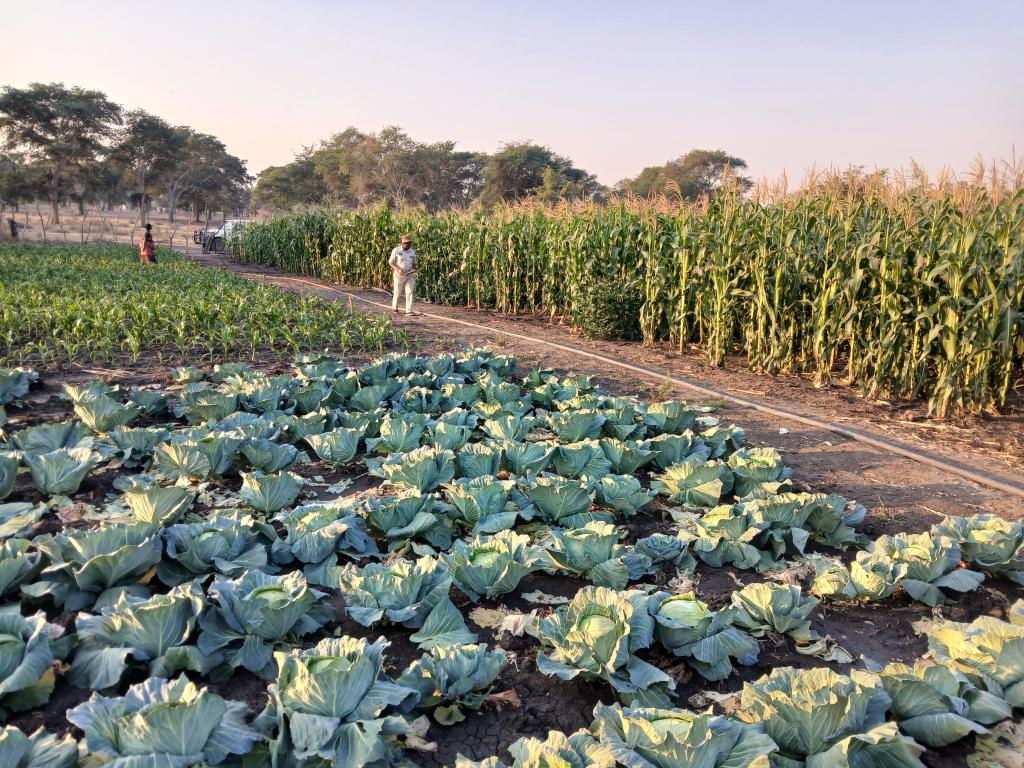Agricultural voucher systems can encourage crop diversification

Crop diversification in effect in Zambia. Photo: EfD South Africa
EPRU-EfD researchers have examined a Zambian agricultural program that impacts 900,000 rural households. The program provides electronic vouchers through which they can select farming inputs to promote crop diversification, crop rotation, and other benefits. Edwin Muchapondwa and Obrian Ndlovu from EPRU-EfD South Africa conducted the study that involved 16 of the 115 districts in the country.
Crop diversification can increase a farm’s resilience to climate change. However, maize mono-cropping is common in Zambia. Crop rotation is especially important for smallholder farmers since food security and nutrition depend on their production.
Crop rotation can allow for soil nutrients to regenerate as different plants use different nutrients. It can also help break pest or disease cycles. Because of this, the Zambian government introduced the Farmer Input Support Programme (FISP), which sought to aid in soil health and improve access to input subsidies. Certain districts were used as a pilot to study the use of electronic vouchers as opposed to traditional support techniques.
Crop diversification has environmental and societal benefits
The researchers selected crop diversification as the central focus of the surveys and interviews for three reasons. First, it enhances climate resilience and food security. Second, the FISP aims to improve access to alternative crop inputs that support crop diversification. Lastly, many smallholder farmers attribute their limited access to inputs or alternative crops to the maize mono-cropping culture. The researchers sought to determine whether the electronic voucher system was effective in promoting crop diversification.
Qualitative and quantitative data help provide context
The research looked at data from surveys conducted in 2012 and 2015, which examined 1518 rural households, high-resolution satellite rainfall data, and interviews with 23 key informants in 2019. The researchers split the surveyed households into two groups. The first group was FISP recipient in one of the 16 e-voucher districts (the treatment group). The second group was FISP recipient households in the non-e-voucher districts (the control group). They also included satellite rainfall data to determine how much rain farmers received, since rainfall can influence a farmer’s decision-making.
They also conducted interviews with 23 agricultural extension service officers. Extension officers were chosen for two reasons. First, the farmers might struggle to recall specifics due to the time that has passed, whereas the extension officers would have a more accurate memory given their roles. Additionally, the extension officers are experts in the agricultural sector, including its potential and challenges. They are required to continuously monitor the farmers they support, leading them to gather a significant amount of data regarding the farmers in the program. The interviews took place in two of the 16 provinces, including one high-rainfall province and one low-rainfall province, to represent the two distinct farming regions within Zambia.
Some diversification but limited effectiveness
The researchers found evidence that the e-vouchers supported increased crop diversification, with the e-vouchers being associated with a 0.231 increase in crop diversification on a scale of 0-1. The interviews indicated that the crop diversification effects could have been watered down through existing barriers. A primary barrier is the lack of certified seeds for alternative crop choices. Even if there are certified seeds, many farmers had trouble acquiring the seeds due to shortages in supply.
An additional concern for farmers is whether there is a market for their crops. The Zambian government provides an assured market for maize across the country but not for other crops. This makes farmers less willing to diversify. The interviewees also mentioned the historical and cultural significance of maize cropping. Many farmers are hesitant to move away from maize mono-cropping as it is what has been done for generations.
Supply chains, market, and extension services are vital
The researchers conclude that to effectively support farmers’ crop diversification, the government should support a private-sector-driven input supply chain. This would give increased access to inputs for farmers and make them more willing to engage in crop diversification. Another effective policy would be to support the linkages between alternative crops and urban centers, to help guarantee that there is a market demand. Finally, increasing access to extension officers and their services could help facilitate increased crop diversification. These policy recommendations would support crop diversification and increase the climate resilience of Zambian farmers.
To read the full article, please visit here